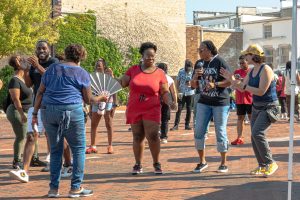Communications dept. holds meeting
October 17, 1990
Students who are interested in becoming communication studies majors and minors or have concerns or questions about the department’s limited space might find it helpful to attend the department’s semesterly meeting.
Arthur Doederlein, undergraduate communication studies director, said the department will hold a meeting Oct. 18 to address any questions or concerns students have about the department or on becoming a communication studies major or minor. The meeting is at 3:30 p.m. in DuSable Hall room 224B.
However, Doederlein said certain concerns about closed courses and the department’s constantly increasing minimum grade point average requirement will “only be discussed to the extent that we share the same concerns.”
“But we can’t do anything until there’s more funding,” to hire more professors which will allow for more open class sections, he said.
The department currently requires students to have a 2.9 overall grade point average before declaring communication studies as a major, Doederlein said. “And it’s always going up,” he said.
The meeting will be routine, he said. The department and Doederlein conducts similar meetings each semester, said Communication Studies Chairman Richard Johannesen.
Students’ questions might include how to get permits, how to declare majors or minors and what their options are if they cannot become a major or minor, Doederlein said.
He said students have had access to a two-page handout on how to request class permits since August. Furthermore, he added students will not have to sign up for any class permits until mail registration begins Oct. 29, when they will have one week to do so.
Doederlein said he is expecting about 4,000 applications for permit classes and there will be a list posted of students who will receive them.
“Declared majors will get permits, and after that it goes by accumulated credit hours,” he said.
Students might have questions about the department or its procedures because they might not be taking advantage of the information provided by the department, Doederlein said.
“We go overboard in trying to get information to students but then the turnout at the meetings is poor,” he said.
Johannesen said students are encouraged to attend the meeting simply as “another another channel to receive information. It’s better to provide as much information about the department as possible.”






